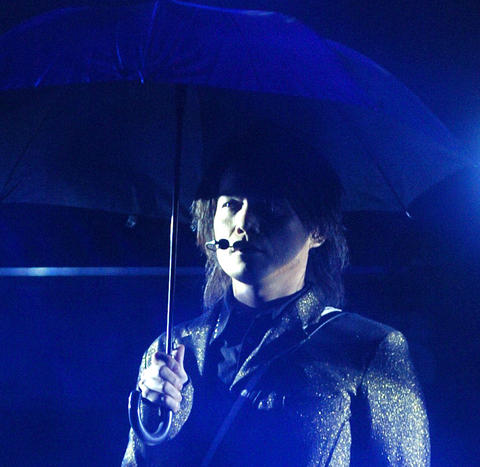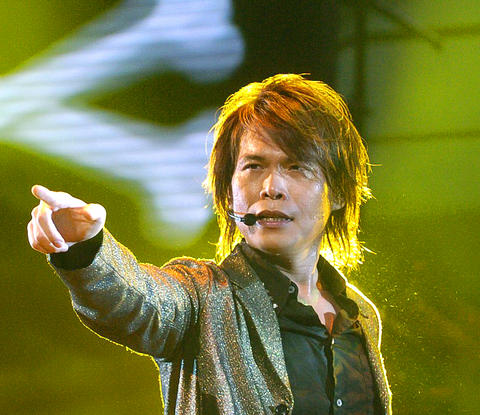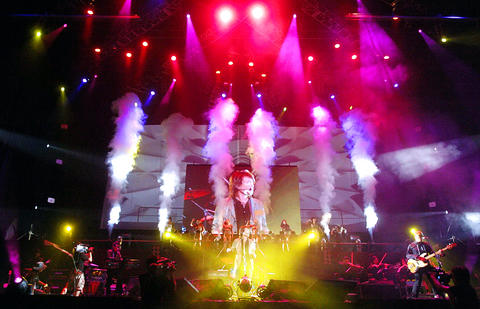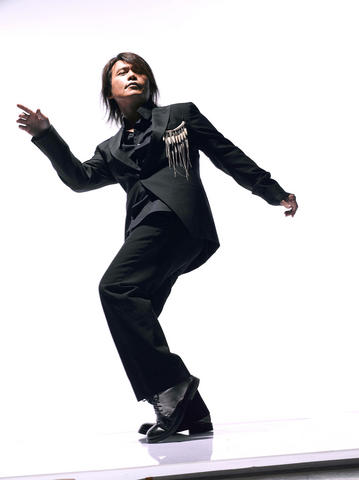Wu Bai (伍佰) and China Blue, who made live, guitar-oriented rock 'n' roll popular in Taiwan, kick off a four-city tour starting at the end of this month and tickets are expected to sell out quickly. Labeled "the king of live music," Wu Bai is one of the biggest pop music stars in East and Southeast Asia, though he has also maintained a measure of local street credibility as the epitome of taike (台客) chic. Once a derogative appellation used to refer to someone with a low-class attitude or style, taike has now been subverted and has gained street credibility
With his distinctive helmet hair, powerful blues-oriented chords and lyrics in Hoklo and Mandarin, Wu Bai emerged in the mid-1990s as the figurehead of Taiwanese rock 'n' roll, packing stadiums with crowds of up to 100,000 and generating record sales of more than 600,000 copies for his most popular albums. Along with May Day (五月天) and Back Quarter (四分衛), Wu Bai and his band - bassist Ju Jian-hui (朱劍輝), drummer Dean "Dino" Zavolta and keyboard player Yu Dai-ho (余大豪) - are one of the few big-time local acts with garage-band roots.
At 39, Wu Bai, whose monikers include the "cult master" and the "king of Chinese rock," has released a dozen studio albums with China Blue. He's also acted in four movies and served as a spokesman for Taiwan Beer. "I pursue light and heat. I like this kind of beautiful lavish life. So I push myself, burn myself, and see how far I can go," he wrote in his biography/photo album retrospective Moonlight Symphony (月光交響曲).

With his Taiwanese-accented Mandarin and rock star looks, Wu Bai, whose real name is Wu Chun-lin (吳俊霖), projects the image of the archetypical taike. Since the first TK Rock concert (台客搖滾嘉年華) in 2005, he has enjoyed new popularity as Taiwanese who are proud of their heritage embrace elements of the country's working-class culture.
Wu Bai and China Blue have a uniquely Taiwanese take on rock 'n' roll, with influences like puppet theater (布袋戲) and old TV variety shows. Zavolta said they favor "more of an Asian pop rock 'n' roll style" that combines power chords with groovy bubble gum pop. "We try to stay on the cutting edge musically and try to keep it real, but still have a certain sound," he said. China Blue was formed in 1991 by Zavolta and Ju, who soon met a then-pudgy young guitarist named Wu Bai. They got their first big break in 1992, when they wrote two songs for a movie soundtrack. Their most popular album, 1996's The End of Love (愛情的盡頭), has sold more than 600,000 copies.
Fans can expect some new material mixed with old hits at the band's upcoming concerts, Zavolta said, but a new album is currently not in the works. "I don't know what we're coming up with next," he said. "I don't know what Wu Bai has up his sleeve."




Wooden houses wedged between concrete, crumbling brick facades with roofs gaping to the sky, and tiled art deco buildings down narrow alleyways: Taichung Central District’s (中區) aging architecture reveals both the allure and reality of the old downtown. From Indigenous settlement to capital under Qing Dynasty rule through to Japanese colonization, Taichung’s Central District holds a long and layered history. The bygone beauty of its streets once earned it the nickname “Little Kyoto.” Since the late eighties, however, the shifting of economic and government centers westward signaled a gradual decline in the area’s evolving fortunes. With the regeneration of the once

Even by the standards of Ukraine’s International Legion, which comprises volunteers from over 55 countries, Han has an unusual backstory. Born in Taichung, he grew up in Costa Rica — then one of Taiwan’s diplomatic allies — where a relative worked for the embassy. After attending an American international high school in San Jose, Costa Rica’s capital, Han — who prefers to use only his given name for OPSEC (operations security) reasons — moved to the US in his teens. He attended Penn State University before returning to Taiwan to work in the semiconductor industry in Kaohsiung, where he

In February of this year the Taipei Times reported on the visit of Lienchiang County Commissioner Wang Chung-ming (王忠銘) of the Chinese Nationalist Party (KMT) and a delegation to a lantern festival in Fuzhou’s Mawei District in Fujian Province. “Today, Mawei and Matsu jointly marked the lantern festival,” Wang was quoted as saying, adding that both sides “being of one people,” is a cause for joy. Wang was passing around a common claim of officials of the People’s Republic of China (PRC) and the PRC’s allies and supporters in Taiwan — KMT and the Taiwan People’s Party — and elsewhere: Taiwan and

Perched on Thailand’s border with Myanmar, Arunothai is a dusty crossroads town, a nowheresville that could be the setting of some Southeast Asian spaghetti Western. Its main street is the final, dead-end section of the two-lane highway from Chiang Mai, Thailand’s second largest city 120kms south, and the heart of the kingdom’s mountainous north. At the town boundary, a Chinese-style arch capped with dragons also bears Thai script declaring fealty to Bangkok’s royal family: “Long live the King!” Further on, Chinese lanterns line the main street, and on the hillsides, courtyard homes sit among warrens of narrow, winding alleyways and